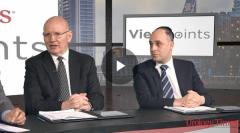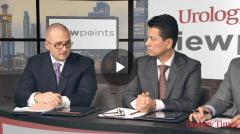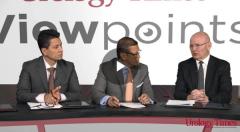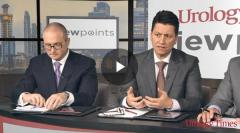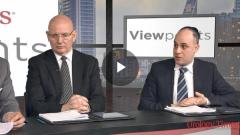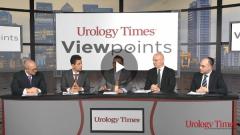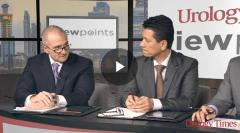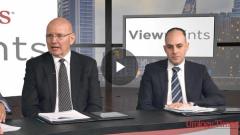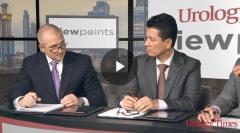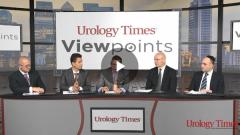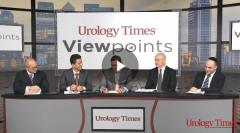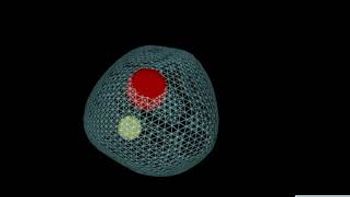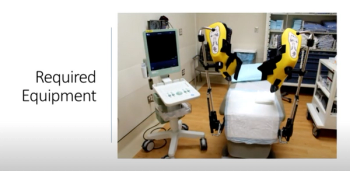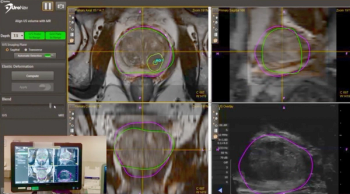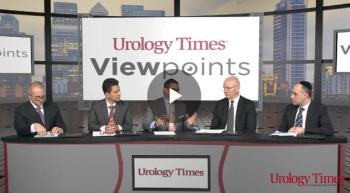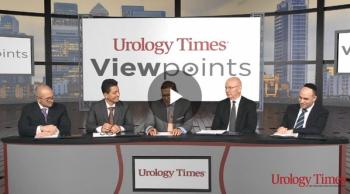
Androgen Receptor Blocker Use in mCSPC
Episodes in this series

[Transcript]
Raoul Concepcion, MD, FACS: Jahan, Jorge did a wonderful summary of sort of the data that [support] docetaxel and abiraterone. We have a couple of other agents that have been approved in the castration-resistant space and are now obviously moving into the metastatic castration-sensitive. Give us a little overview about what those trials are looking like and where we see these drugs essentially, hopefully getting approved.
Jahan Aghalar, MD: In the last 2 years, we’ve seen a handful of trials looking at other agents in this space, in the metastatic castrate-sensitive space, particularly in the TITAN trial looking at apalutamide, which was initially FDA approved for the nonmetastatic castration-resistant setting. We’re going to discuss this later, to see whether there’s any role in using this agent in the castrate-sensitive metastatic space.
A unique [point] with this trial was the fact that investigators did not necessarily discriminate between high-volume and low-volume disease, although they did stratify those patients. They also did allow lymph node–positive disease up to 2 cm. And they actually found that not only was there a progression-free survival benefit, but there was actually an overall survival benefit irrespective of the degree of volume of disease, whether there was low-volume or high-volume disease. Today, data for docetaxel have not been supportive, in terms of providing an overall survival benefit in the low-volume patients.
There have also been 2 large randomized trials looking at the usage of enzalutamide in the same setting, 1 being the ARCHES trial published by Dr Andrew Armstrong’s group in the JCO [Journal of Clinical Oncology] this year, along with the ENZAMET trial at ASCO [the American Society of Clinical Oncology Annual Meeting] this past year. Although the ARCHES trial did not show an overall survival benefit, many experts are confident that there is a survival benefit, the data just haven’t matured yet. The interim analysis did show a very significant radiographic progression-free survival of about 22 months.
The ENZAMET trial also did show benefit among multiple parameters. As of now, there is no FDA-labeled indication for enzalutamide within this space. However, there’s an NCCN [National Comprehensive Cancer Network] compendium category 1 recommendation in terms of using it. And there’s an ongoing trial by the name of ARASENS using the newest androgen receptor blocker, darolutamide, and we are eagerly waiting for the results of this trial.
Raoul Concepcion, MD, FACS: It’s important for the viewer to really recognize that. To your point-and it’s a very strong, important point-again, right now based on what Jorge presented, from CHAARTED, LATITUDE, STAMPEDE, and obviously TITAN, those are drugs you can readily use in this metastatic castration-sensitive disease. It’s still waiting to happen relative to basically ENZA [enzalutamide] and obviously darolutamide.
Jahan Aghalar, MD: One other point I would like to make is that we are now seeing patients who have already received docetaxel. I just want to point out as well, in the trials that I just mentioned, they did include patients who had previous docetaxel as well. In particular, in the TITAN trial, that group did not necessarily show an overall survival benefit, but that might be because of lack of maturity of the data.
Raoul Concepcion, MD, FACS: Right.
Jorge Garcia, MD: If I may expand on that a little, because I think that’s a very important point. There are 2 camps of practitioners right now for us: those who believe in chemotherapy up front and those who believe in an oral agent up front. I just don’t know that we have any data to suggest that 1 agent is better than the other agent, oral versus chemotherapy. I also want to actually comment that if you look at the latest STAMPEDE follow-up-and that data was presented by the British group at ESMO [European Society for Medical Oncology Congress] in Barcelona over a month ago or so-it does appear that there is no heterogeneity in the 2 volume patient populations, indicating perhaps that docetaxel still could be a viable option for people with low-volume disease.
Most of us in the United States probably feel that low-volume disease should get an oral agent, perhaps the perception of adverse effects of chemotherapy. But it’s important to recognize that oral therapy has toxicities even when you start early on. Chemotherapy also has unique toxicities when you start early on.
The second big question is the timing of utilization of these agents. By that I mean, did you do ADT [androgen deprivation therapy]–docetaxel? Did you complete docetaxel and did you follow up with an oral agent sequentially? Or who are the patients who may benefit from triple therapy, which to your point, Jahan, is the ARASENS data. ENZAMET had to run 40%, 50% of patients who were getting triple therapy. That data did not show survival benefit and all this immature data. There are a lot of concerns. I’m concerned about that data because I just don’t know if maybe the interaction between oral therapy and docetaxel, and perhaps liver metabolism, can influence PK [pharmacokinetics] and PD [pharmacodynamics]. One of those 2 agents may minimize the effectiveness of the triple regimen. We have to wait for that data to mature, certainly for ENZAMET and for ARASENS to actually get published just to really see who the patient populations are who benefit most from that triple up-front approach.
Jahan Aghalar, MD: The other way to interpret that data is that perhaps docetaxel in and of itself is enough to provide that overall survival benefit. If you want to add any therapy at that castration-sensitive setting and perhaps add an oral agent at that point, it may be a little premature. We’ll have to see how the data mature.
Raoul Concepcion, MD, FACS: You know, the other thing that we don’t know, because all the trials were designed, you either got ADT or you got ADT-plus immediately. What we don’t know is, can you get ADT, delay, and then add on? When does that take place? Because in all the trials, it’s all or none. It’s basically all or none.
Jorge Garcia, MD: But you would agree that you and I, and all of us as a group, would be very disturbed with this data today in 2019 if we find patients who actually get ADT up front, wait for the presumed benefit-which is probably seen in around 90% of patients or so-and the physicians or practitioners feel comfortable just keeping the patients on ADT because they’re benefiting from therapy. And I think although the PFS [progression-free survival] reduction is great, you are sacrificing mortality and you’re sacrificing the benefit of that survival improvement if you don’t intensify therapy.
Raoul Concepcion, MD, FACS: I think the data that you quoted with less than 50%, it’s the 30%-to-40% range of patients who are getting ADT that holds for both medical oncology and urology.
Panelists:
- Raoul Concepcion, MD, FACS, Vanderbilt University School of Medicine, Nashville, Tennessee
- Jahan Aghalar, MD, Board-certified Hematologist and Oncologist, New York, New York
- Gordon Brown, MD, Rowan University School of Osteopathic Medicine, Glassboro, New Jersey
- Jorge Garcia, MD, Cleveland Clinic, Cleveland, Ohio; Jonathan Henderson, MD, Regional Urologist, Shreveport, Louisiana
- Paul Sieber, MD, Penn Medicine Lancaster General Hospital, WellSpan Ephrata Community Hospital, Lancaster, Pennsylvania
Newsletter
Stay current with the latest urology news and practice-changing insights — sign up now for the essential updates every urologist needs.

